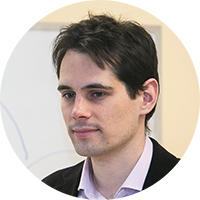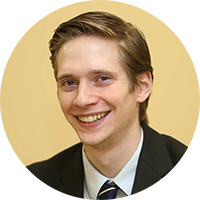‘What Thrilled Me is How Close the Programme is to Real Business’
On February 6th, 2015 the Russian module of the internationalMaster in European Business programme concluded. This programme is being run by the HSE International Institute of International Institute of Administration and Business (IIAB) together with ESCP EUROPE business school. In the second semester, students will continue their studies in various ESCP campuses around Europe: London, Berlin, Torino, Paris, and Madrid. The English-taught programme is aimed at teaching practical management skills in an international team and cross-cultural environment, which is provided by attracting students from various countries. MEB graduates receive two diplomas: a Master in European Business degree from ESCP EUROPE, and a HSE diploma of professional retraining.
At the end of the Moscow semester at HSE IIAB, the students present their consulting projects based on cases provided by international companies, members of the IIAB’s Supervisory Board. This year the programme participants analyzed the operations of GDF Suez oil and gas company, Renault automobile group, and NTT, a Russian logistics company. The students provided recommendations on business development for these companies.
‘Every company wants to have good employees, and the MEB programme is a kind of filter which allows us to select the best candidates’, said Albert Grigoryan, general representative in Russia and Ukraine of the French gas company GDF Suez, ‘Graduates from this programme come to our company with a substantial body of knowledge. Their work on analytical projects allows the participants to look at a real company and get the practical skills that are necessary for building a successful career. Such projects combine a structural approach and a focus on business operations’.
The graduates also mention the programme’s combination of a serious practical approach and the good theoretical preparation offered by the MEB programme’s teaching staff. On February 6, 2015, the first programme graduates, Aram Avetisyan and Ricardo Shaitanov, received their diplomas after defending their consulting projects. The rest of the students are currently having internships in Europe.
‘My first degree is in technical sciences, and my second in linguistics’, said Aram Avetisyan, ‘I was working in Samsung but felt that I lacked structured knowledge. I had to learn everything through a trial-and-error method, and because of this I came to the MEB. I was looking for a programme with a strong international component. I looked through the top five universities that offered business and economics and chose the MEB. It has been very convenient for me to study in the evenings during the first semester in Moscow, since I had the opportunity to continue working’. Aram Avetisyan added that the programme has given him the opportunity to look at business as a whole. He also said that IIAB students study in a small class, which provides a personal, virtually individual approach to teaching.
For international participants this programme is also a great chance to get to know Russia and Moscow. ‘I was looking for an opportunity to come to Russia’, said Ricardo Shaitanov from Germany, ‘I am very satisfied with the programme. I’m planning to come back for an internship here and probably find a job in Russia in an international company’.
Below are some opinions of this year’s students of the programme.

Dorian Marquer-Andronov (France)
‘What thrilled me is how close the programme is to real business. I’ve been combining study with work, and I’ve had several situations when the topics we were looking at during the classes could be immediately used in my work. This was an additional motivating factor for me: the programme is very intensive, it was difficult to study, yet very interesting. I also like the programme format: evening classes and a double degree from the HSE and a French business school’.

Maria Volkova (Russia)
‘I wanted to get a European degree and chose the MEB programme, since it includes one semester in Moscow. The programme has made my knowledge systematic and enriched it. Since my first education is in linguistics, I was especially keen on the courses in new fields for me, including accounting, finance and economics’.

Jacob von Gordon (Germany)
I chose the programme because I liked the element of intercultural learning where you study at two different European campuses. I really liked gaining a new insight into these countries. I specifically chose Moscow because I was interested not only in everyday continental Europe but wanted to go a bit further afield and I didn’t regret it. Moscow in many ways is a lot more modern and HSE is a very high level university in terms of its professors and the quality of the subjects offered.
We were very well treated and taken care of as foreigners. Our small group was an advantage as well. We were quite lucky because of that. The real Moscow is quite different from the portrait painted in the media. I’ll make it one of my tasks to spread the word of how cool the place actually is and what it is really like.
We got the opportunity to attend free language courses and earn ECTS credits. I also enjoyed the management course because it was very diverse – we had finance, intercultural behavior, accounting – basically, everything you need to know as a manager, but also these things from the perspective of Russian professors and Russian business. This is something that European campuses don’t receive – this insight and a comparison of European business mentality and Russian business mentality.
I’d like to add that the dormitory is quite good and the student life is very affordable. The university has excellent facilities and is well-equipped. I also enjoyed the extracurricular activities, for example, the debating society. We didn’t often get a chance to participate because of our intensive schedule but we could still take part from time to time. It was also great that we got integrated into the life of Moscow HSE international community of students from other partner universities. There were many trips organized for us, practically every weekend, to places of interest around Moscow, Sergeev Posad, for instance, or Etnomir. The Facebook group for International students always had some interesting announcements for us about various activities.
I’ll definitely try to come back for an internship here. Also, while I was studying here I tried to spot possible niches for startup businesses as it would be very interesting for me to do business in Russia, although of course, that would mean I’ll need to improve my Russian.

Marie-Héléne Merlet (France)
I chose to come to Moscow because I speak a little Russian – I studied Russian because my grandmother was from Russian regions. I really wanted to discover this country and discover Moscow because I think in Europe we have the wrong idea about this country and about the people living here. Before I came I had some feedback from other students, so I knew that Moscow was a great city but I was still a bit scared – I didn’t really know what to expect. But I’m really glad that I came – I could see everything for myself. Moscow is a big city just like any other big city in the world. The university has been very welcoming and everything was really great here. I really liked the support that I received from HSE when I arrived – I didn’t feel alone. The student life is really great here – although unfortunately we couldn’t participate in all the events because we had classes in the evenings. I lived in the dormitory – I was really surprised by the quality of student accommodation. It was clean and it was great living with people from different countries – it was truly cosmopolitan – Armenian, Spanish, French, German, Russian. I am truly glad I stayed there.
The company project was very interesting – in my case it was Renault. I think I’ve learnt different things through working on a real case. I would like to work in an international firm. I am particularly interested in operational management and marketing. If I have the opportunity to come back to Moscow or Russia I would gladly return.
See also:
‘In the Future, I Would Like to Become an HSE University Teacher’
Karina Kuzhanova, third-year student at the Faculty of Law, and Anna Yatsenko, second-year student at the Faculty of Economic Sciences, moved to Moscow from Kazakhstan to study at HSE University. They shared their impressions of studies and student life with the HSE News Service, as well as talking about some of the most inspirational things in the Russian capital.
HSE Saint-Petersburg Will Teach PMI Project Management
Higher School of Economics in Saint-Petersburg is now recognized as a registered education provider (R.E.P.) of the Project Management Institute (PMI). PMI develops standards, conducts research, educates, publishes articles, journals and books, enhances cooperation opportunities in regional branches, holds conferences and training seminars, and accredits in project management.
International Spring School on Human Rights Debates Issues of Religion, Identity and Freedom of Conscience
In May, the HSE Voronovo Learning Centre hosted the International Spring School on Human Rights, a five-day educational retreat organized jointly by the HSE Department of Public Policy, the University of Bologna and the International Institute of Human Rights in Strasbourg.
HSE Becomes Member of Erasmus Student Network
HSE’s volunteer organisation, which is made up of student ‘buddies’ who help foreign students adapt to life in Russia, has become a part of the Erasmus Student Network.
Studying Software Engineering at HSE
The Master’s programme in System and Software Engineering aims to provide students an opportunity not only to acquire the knowledge and experience they need in their chosen profession, but also to help them generate a systemic view on bringing resolutions to the difficult professional challenges they are certain to face in the future. Academic Supervisor Dmitry Alexandrov talks about programme features and international students share their experience of living and studying in Moscow.
Dutch Student Investigates Languages of the Caucasus
Samira Verhees, a Ghent University alumna and doctoral student at the HSE School of Linguistics, spoke about her Caucasian studies.
Students Come from Far and Wide to Study Big Data Systems
The Master’s programme in Big Data Systems at the Higher School of Economics focuses on the value aspect of big data for large enterprises and the implementation of big data technology in enterprises. Two current students of the programme share their thoughts about what drew them to HSE to study big data, what they hope to gain from the programme and what advice they would give to prospective international students.
French Delegation Visits School of Business Informatics to Discuss Cooperation in Big Data Studies
In March 2016, the School of Business Informatics (Faculty of Business and Management) at HSE was visited by a delegation from France’s University of Évry; in late 2015, a student exchange agreement was signed between HSE and this university. The delegation brought 19 students from the Master’s programmes in the field of big data at the University of Évry to Moscow.
Spring School Provides Italian Students Intense Exposure to Russian Culture
‘Texts and Places: Introduction to Russian History, Language and Culture’ (I testi dei luoghi: introduzione alla storia, alla cultura e alla lingua russa), an international Spring School at HSE organized jointly by Julia Ivanova, leading research fellow at the Poletayev Institute for Theoretical and Historical Studies in the Humanities, and the University of Eastern Piedmont Amedeo Avogadro, took place from March 15 to 23.
American Student Does Mathematical Research at HSE
Nicholas Howell is a PhD student at University of Oregon. He came to HSE Faculty of Mathematics on the invitation of his research advisor Vadim Vologodsky to do research during two months. In his interview Nick talks about his time in Moscow.


